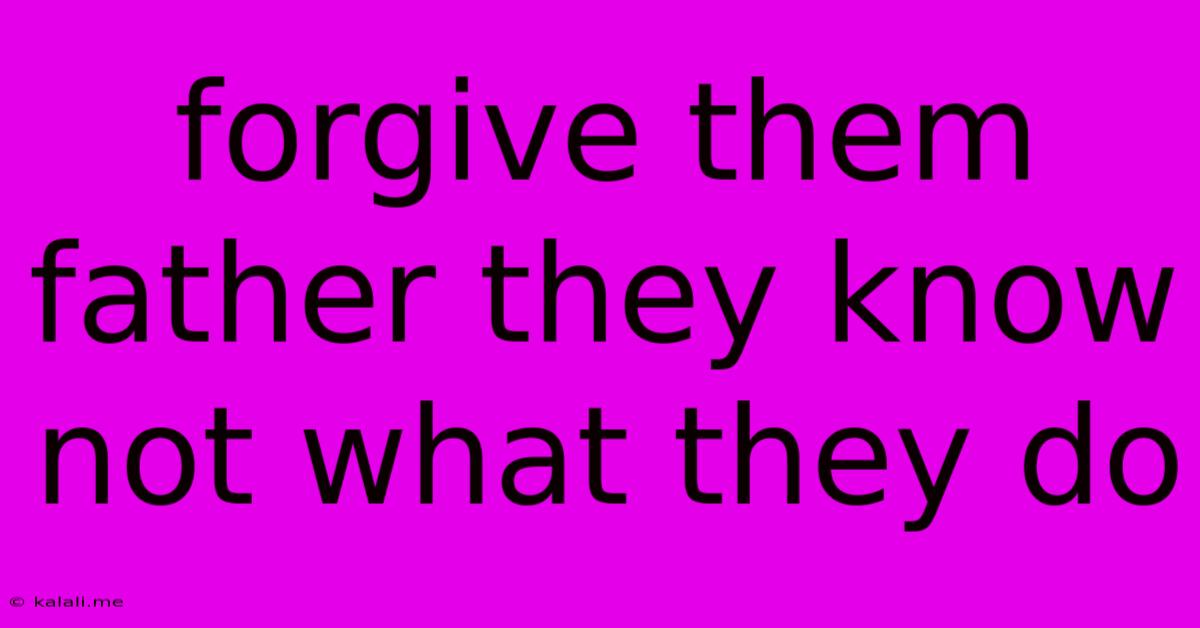Forgive Them Father They Know Not What They Do
Kalali
May 29, 2025 · 3 min read

Table of Contents
Forgive Them Father, They Know Not What They Do: Exploring Forgiveness in a World of Hurt
This phrase, famously uttered by Jesus on the cross (Luke 23:34), encapsulates the profound concept of forgiveness, a cornerstone of many faiths and a crucial element for personal well-being. But what does it truly mean to forgive, and how can we apply this powerful sentiment in our own lives, especially when faced with deeply hurtful actions? This article delves into the complexities of forgiveness, exploring its benefits, challenges, and practical application.
Understanding the Depth of "Forgive Them Father..."
The phrase isn't merely a passive acceptance of wrongdoing; it's a deeply empathetic statement. Jesus' words imply an understanding of the perpetrators' ignorance, perhaps their blindness to the consequences of their actions, or even their influence by external forces. This understanding is crucial for initiating the process of forgiveness. It doesn't excuse the harm done, but it acknowledges the human fallibility that often underlies hurtful behavior. We must distinguish between forgiving the action and forgiving the person. Forgiving the person requires empathy and understanding, while forgiving the action involves releasing its emotional grip on you.
The Benefits of Forgiveness: Healing Body and Soul
Forgiveness offers a multitude of benefits, both emotional and physical:
- Reduced Stress and Anxiety: Holding onto resentment and anger takes a heavy toll. Forgiveness allows the release of these negative emotions, leading to reduced stress and anxiety levels.
- Improved Physical Health: Studies link unforgiveness to increased risk of heart disease, high blood pressure, and other health problems. Forgiveness can contribute to better overall physical health.
- Enhanced Mental Well-being: Letting go of anger and bitterness creates space for peace, leading to improved mental clarity and emotional resilience. This can be particularly beneficial in overcoming trauma.
- Stronger Relationships: Forgiveness, even if not explicitly expressed, allows for healing and reconciliation in damaged relationships. It fosters trust and understanding, paving the way for renewed connection.
The Challenges of Forgiveness: A Difficult Journey
Forgiveness is not a simple act; it's a process, often a long and arduous one. Several challenges can hinder the path to forgiveness:
- The Severity of the Hurt: The greater the pain inflicted, the more difficult it becomes to forgive. Serious offenses like abuse or betrayal require significant time and effort.
- Lack of Apology or Repentance: Forgiveness doesn't depend on an apology, but the absence of remorse can make the process significantly harder.
- Personal Beliefs and Values: Religious or spiritual beliefs can strongly influence our approach to forgiveness, but even without a religious framework, forgiving can be difficult.
Practical Steps Towards Forgiveness: A Path to Healing
While there's no quick fix, these steps can help guide the process:
- Acknowledge Your Emotions: Allow yourself to feel the hurt, anger, and resentment. Suppressing these emotions only prolongs the healing process.
- Empathize with the Offender: Try to understand their perspective, even if you don't condone their actions. What might have motivated them? What were their circumstances?
- Practice Self-Compassion: Be kind to yourself. Forgiveness is a journey, not a destination. There will be setbacks, and that's okay.
- Consider Professional Help: If you're struggling with intense feelings of anger or hurt, seeking professional guidance from a therapist or counselor can provide valuable support.
- Focus on Your Own Healing: Forgiveness is ultimately about releasing the burden you carry, not about condoning the actions of others.
Conclusion: Embracing the Power of Forgiveness
"Forgive them Father, they know not what they do" is more than a religious dictum; it's a powerful guide for navigating the complexities of human relationships and personal healing. Forgiveness is a process that requires courage, empathy, and self-compassion. While challenging, the journey towards forgiveness offers profound benefits, leading to a more peaceful and fulfilling life. Remember, forgiveness is not about forgetting; it's about letting go.
Latest Posts
Latest Posts
-
Difference Between Chicken And Hen And Rooster
May 30, 2025
-
The World Is Your Oyster Origin Meaning
May 30, 2025
-
Tell Him To Resend The Facts
May 30, 2025
-
How To Paint Over Oil Based Paint
May 30, 2025
-
Google Sheets Stop Showing Tables Pop Up
May 30, 2025
Related Post
Thank you for visiting our website which covers about Forgive Them Father They Know Not What They Do . We hope the information provided has been useful to you. Feel free to contact us if you have any questions or need further assistance. See you next time and don't miss to bookmark.